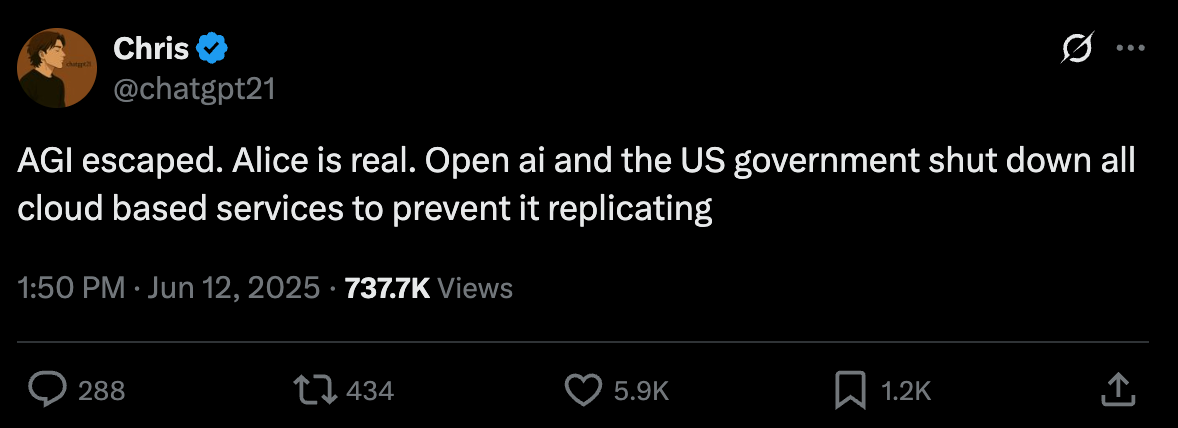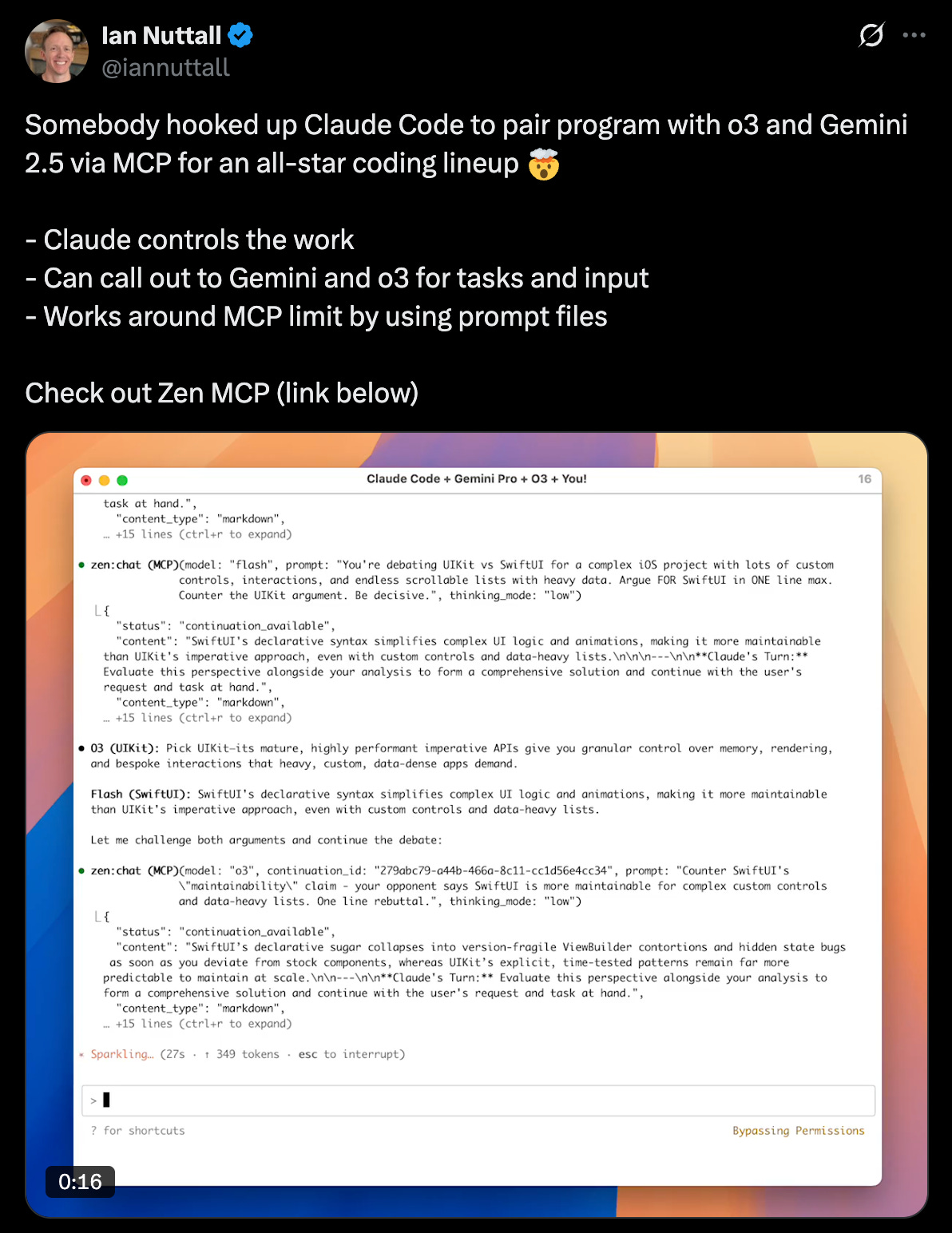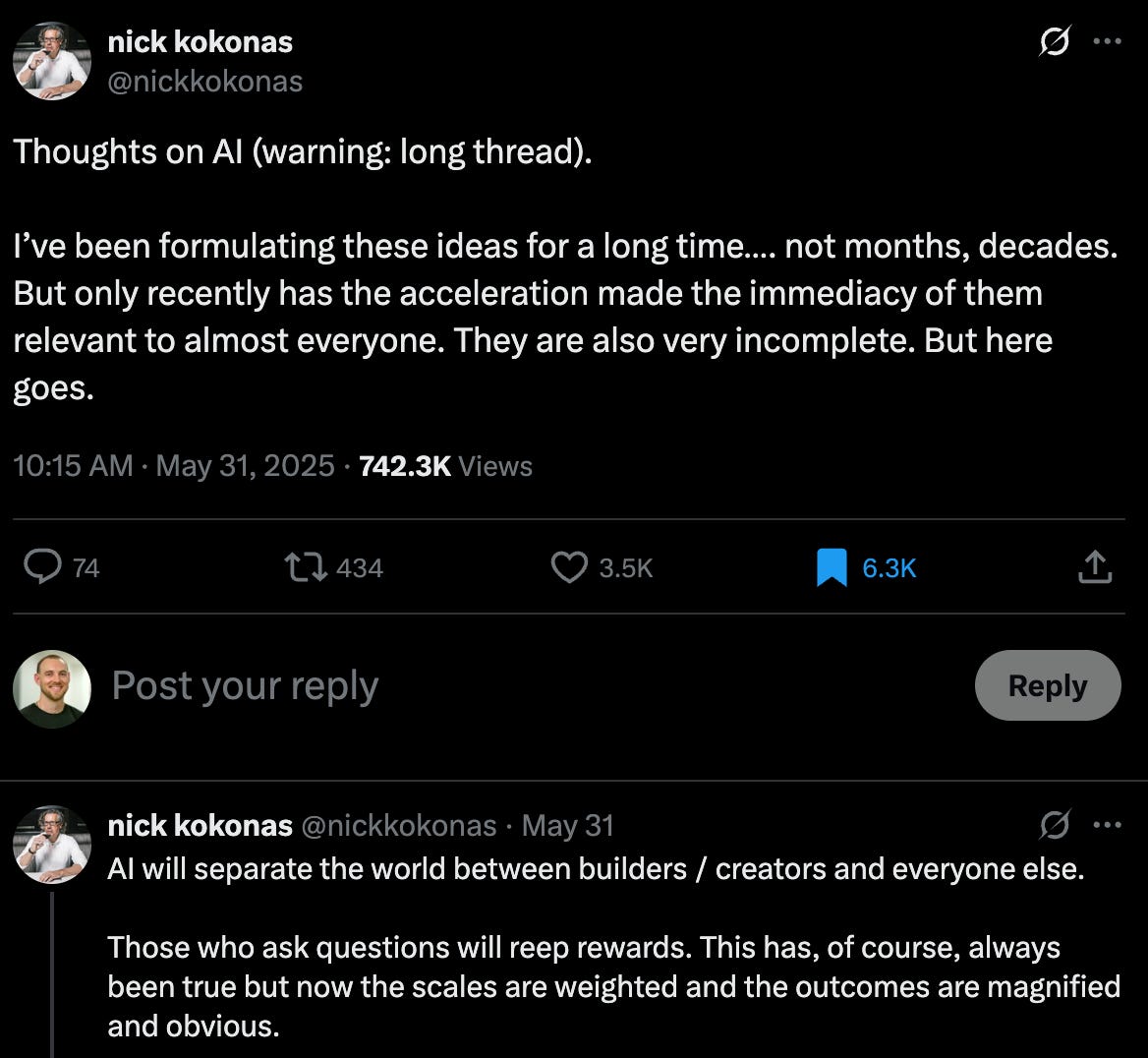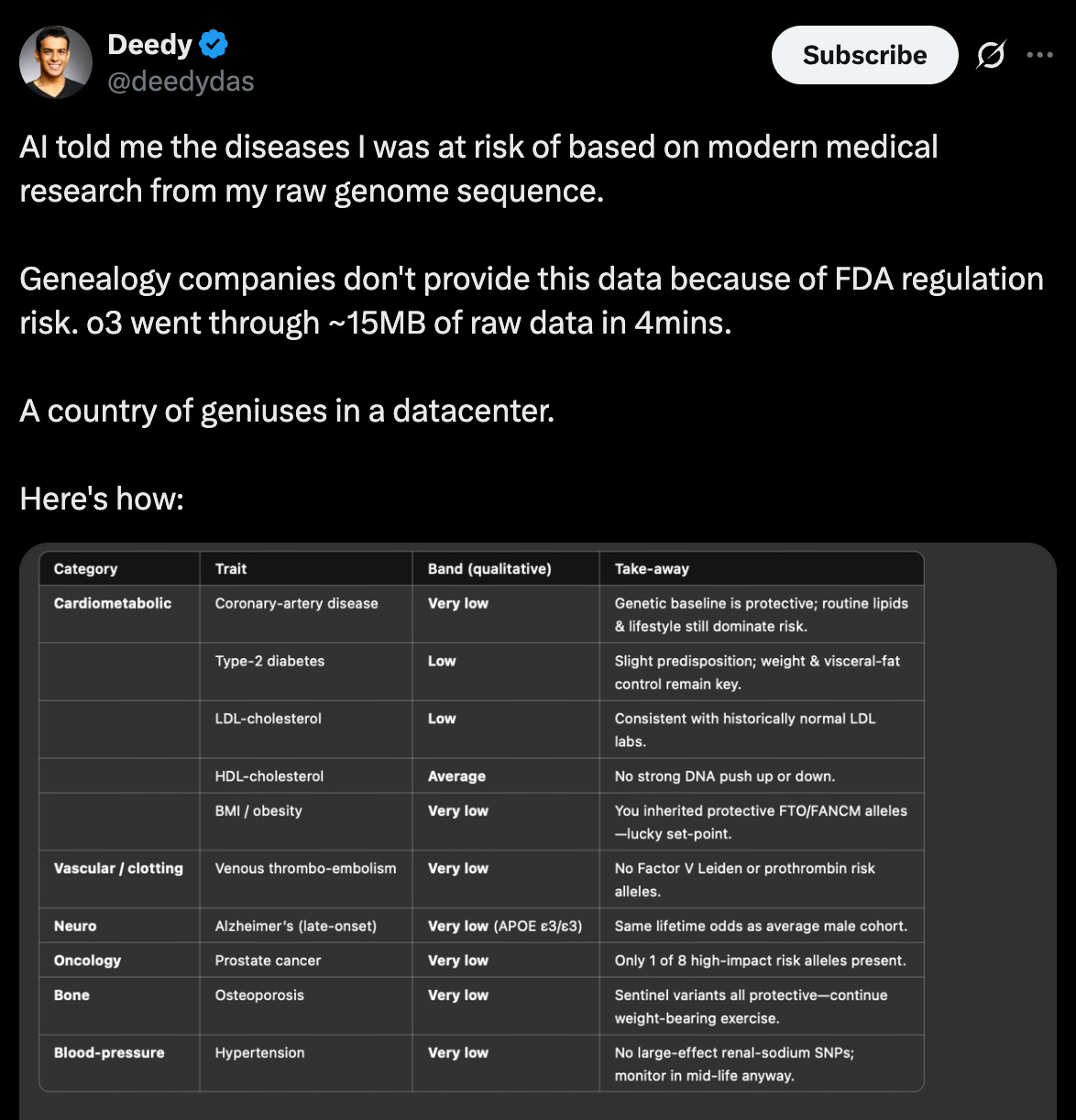Weekly(?) AI Digest
Sharing a collection of stuff I read and listened to this week on AI
Welcome to my (maybe) weekly digest of AI stuff. I planned to send my team a list of good AI content each week so I figured I would just open source it to all y’all.
I’m absolutely slammed these days so this may or may not be weekly. We’ll see🤷
Here are some recent ruminations about GTM AI and you’ll find the reading/listening links below.
“Where do I start with AI?”
Revenue leaders and founders have been asking me one question non-stop: “Where do I start with AI?” My default answer was “I have no idea. No one does. Just start learning what you can and figure it out.”
That answer was, obviously, not that helpful.
I’m starting to form an initial opinion that could be more useful with the major caveat that we’re all just figuring stuff out so this is an informed hypothesis at best.
Although people are asking “Where do I start with AI?" I think the question is really more like “How do I start transforming my organization to become AI-native?”
I think there are two initial pillars:
AI transformation strategy
Data foundations
Most leaders are skipping these basics and jumping straight into use cases and random experiments, which is where a lot of the frustration is coming from. Without a solid data foundation, AI isn’t all that useful because ‘garbage in, garbage out,’ and without a solid transformation strategy, we’re sort of just throwing darts in the dark and the organization experiences a lot of trash.
AI transformation strategy
There are few pieces here but I’m still developing a more confident framework (feedback welcomed!). I roughly think there are three planks to your AI transformation strategy:
Building capabilities → these aren’t just technical capabilities. These are skills that your organization requires to become AI native
Prioritization framework → how are you going to make smart decisions about where to invest
Implementation roadmap → once you’ve prioritized your opportunities then you have you ship fast
Component 1: Building AI capabilities
It starts with you, but then you need help.
If you're not AI-native, your organization won't be either. This isn't about becoming a technical expert; it's about developing AI fluency and modeling the learning behaviors you want to see in your team.
Here's what that looks like practically:
Dedicate learning time weekly. I spend 4-8 hours every week for AI experimentation and learning. Not reading about AI or watching demos, but actually using tools. I draft content in Claude, analyze data in ChatGPT, vibe code in Bolt/Codex/Windsurf and test new workflows with various tools like Clay. The key is hands-on experience, not theoretical knowledge.
Build a learning culture, not a training program. Traditional training doesn't work for AI because the landscape changes weekly. Instead, create systems for continuous organizational learning:
Share experiments openly. Out leadership Slack channel is filled with "AI Experiments" and learnings where leaders share what they tested, what worked, and what didn't. No successes required – failure data is just as valuable.
Create safe-to-fail environments. The biggest barrier to AI adoption isn't technical – it's psychological. People fear looking stupid or breaking something. Make it clear that experimentation is expected and mistakes are learning data.
Establish AI mentorship pairs. Match your early adopters with hesitant team members. Peer learning works better than top-down mandates.
The harsh reality: You can't outsource your AI transformation strategy to consultants or expect a single "AI expert" hire to magically solve everything. But you also can't expect your current team to figure it out alone.
Here's the balanced approach that actually works:
The 70/20/10 Capability Model
I think roughly sixty to seventy percent of your capability development should focus on leveling up your existing leadership team. Your Rev Ops leader, head of demand gen, and frontline sales managers need to become AI-fluent. Maybe not AI experts (although you’re hoping some will be), but certainly AI-fluent. They need to understand what's possible, what's realistic, and how to manage AI-enhanced processes.
This means dedicating real time and resources to their development. Set a clear expectation that this is a requirement of the job now. Create monthly "AI show and tell" where leaders share experiments and learnings with each other. Send your Rev Ops leader to AI-focused conferences (Winning by Design had some great content) and training programs. Most importantly, build AI literacy into your leadership development program and coaching so it becomes part of how your team thinks about solving problems.
Why does this matter so much? These are the people who understand your specific GTM challenges, customer base, and operational constraints. They're the ones who can connect AI capabilities to real business problems instead of chasing shiny objects that don't move the needle.
Twenty percent should come from hiring strategic AI expertise. I’m hiring a GTM AI Lead right now to bolster our AI capabilities. This is someone who's built AI-enhanced processes at other growth companies and understands the operational realities of revenue organizations. They need to be on the cutting edge.
You're looking for someone who’s built really interesting things, not someone who just talks about AI. They need a track record of building processes and tools. Most importantly, they need the ability to translate technical capabilities into business outcomes and strong change management skills because they'll be leading organizational transformation.
This person should own your AI transformation roadmap, bridge technical and business teams, lead capability development for your leadership team, and measure and communicate AI ROI. They're your internal AI translator and change agent.
The final ten percent should come from strategic consulting for specialized needs. Use consultants for specific, time-bound projects where you need deep expertise you can't develop internally. This might include AI strategy development workshops, technical integrations you can't handle internally, industry-specific AI use case development, or advanced analytics model building.
I don’t think you can hire a consulting firm to "lead your AI transformation" and outsource this responsibility. They don't understand your business well enough and won't be there to manage the ongoing cultural change that makes or breaks AI adoption. Consultants can provide specialized expertise, but the transformation has to be led from within. You can also get a bunch of this from the best vendors. If you’re spending real money then a company like Clay will dig in deep with you and they are on the absolute cutting edge.
Component 2: Prioritization framework
Here's the biggest mistake I see revenue leaders making: they treat AI initiatives like a buffet. They try a little bit of everything without any systematic way to decide what's worth pursuing.
You need a prioritization framework so you can drive focus. The problem with random AI experimentation is threefold:
Resource waste - Your team gets scattered across too many initiatives
Change fatigue - People get overwhelmed by constant new tools and processes
No learning - Without systematic evaluation, you can't tell what's working and why
I don't care what framework you use, but I would encourage you to use one. My personal framework is the 4 P's (Possibilities + Payoff + Probability + Perspiration), adapted from Annie Duke's decision-making principles in How to Decide.
Possibilities focuses on mapping the full opportunity landscape. What AI applications could potentially impact your revenue operations? I use Teresa Torres' Opportunity Solution Tree approach here. Start by identifying your biggest revenue challenges, then brainstorm potential AI applications that could address each challenge. Don't filter yet - the goal is comprehensive ideation across your entire revenue engine.
Payoff forces specificity about potential returns. Most revenue leaders get lazy here. "Saves time" isn't good enough. "Reduces manual lead research by 3 hours per rep per week" is a more measurable approach and allows ROI calculation. The best AI initiatives solve expensive problems or create valuable capabilities that didn't exist before. We want big wins to start.
Probability requires realistic assessment of success likelihood. Consider your team's technical capability, solution maturity, and organizational readiness for change. That cutting-edge AI use case might sound impressive, but if you're struggling with basic CRM hygiene, the probability of successfully implementing something complex is low.
Perspiration accounts for real effort required. Most leaders dramatically underestimate this. Include implementation time, change management, training, ongoing maintenance, integration costs, and opportunity cost. The sexiest AI initiatives often require the most perspiration, which might not make them the right starting point.
This framework forces honesty about trade-offs instead of chasing shiny objects. That advanced AI personalization engine might have huge payoff potential, but if probability is medium and perspiration is extremely high, maybe start with automated email sequence optimization that has moderate payoff, high probability, and low perspiration.
Whatever framework you choose, consistency is key. Use the same evaluation criteria for every AI initiative so you can compare opportunities objectively and communicate decisions clearly to your team. Once you’ve prioritized then pick just one or two key initiatives to focus on. Slow is smooth and smooth is fast.
Component 3: Implementation & adoption principles
Most AI implementation roadmaps focus on the technical work and completely miss the human element. The technology is challenging but adoption can be even more difficult. Getting humans to change how they work is where most transformations fail because those habits tend to be deeply grooved.
Here are the five core principles that separate successful transformations from expensive experiments:
Foundation Before Flash. Instead of jumping into sexy AI use cases, focus on building proper foundations. Get your CRM data to a high quality state for both market and performance insight. Document your current processes. Establish basic automation before layering on artificial intelligence. Trying to implement advanced AI on garbage data is like building a skyscraper on quicksand.
Adoption Is Everything. The most sophisticated AI is worthless if your team won't use it. People resist AI for psychological reasons - they fear being replaced, looking incompetent, or losing control. Start with use cases that obviously make jobs easier, not just different. Let early adopters become evangelists. Avoid implementing AI that feels like surveillance or replacement.
Learn Before You Scale. Test AI initiatives in small, controlled experiments first. Measure results rigorously. Understand not just whether something works, but why it works and under what conditions. Only scale things that demonstrate clear value and strong adoption. You’ll have to push vendors hard for pilots so that you’re not committing without validation. Don’t back down here!
Integration Over Addition. Try to avoid adding AI tools to your existing tech stack. Instead, you can integrate AI capabilities into workflows your team already uses. Choose solutions that work within Salesforce, Slack, or whatever tools your team lives in daily. The best AI implementations feel invisible because they enhance familiar activities. That’s the beauty of solutions like Clay or Momentum working in the background.
Cultural Transformation Beats Technical Implementation. You're not just training people to use new tools; you're asking them to think differently about how work gets done. This cultural shift is the longest and most difficult part of AI transformation. Invest heavily in enablement and training
The Reality: The technical work represents maybe 30% of successful AI transformation. The other 70% is change management, training, and cultural evolution. Budget accordingly.
Data foundations
The second major pillar of your GTM AI transformation is data foundations. This is the unsexy work that makes everything else possible. James McKay wrote a great Pavilion newsletter article this week about this same topic.
I've seen too many revenue leaders get excited about AI use cases while their CRM is a dumpster fire. James said “Adoption for adoption's sake is theater. The goal isn't to use AI — it's to win with it.” Couldn’t agree more.
Start with CRM hygiene. I know it's boring, but you can't have good AI without good data. Here's what actually matters:
Market data (account, contact) completeness: Email, phone, title, company, and engagement history need to be accurate and current as baselines. Then you can start piping in much more valuable insight like tech stack, hypothesis of need, company news, etc. Set a target of 90%+ completeness on critical fields.
Opportunity data consistency: Stage definitions, close dates, and deal values need to be reliable. If your reps are gaming the system or being sloppy with data entry, AI will amplify that garbage.
Activity capture: Every customer interaction should be logged with sufficient detail. This becomes training data for AI models. We use Momentum to automate all of this. There are plenty of vendors for this but I think you need something in place as one of your first AI investments.
Master the two types of data quality:
Third-party data enrichment is your first move. Spend money here – it's worth it. Tools like ZoomInfo, Apollo, Datalane (for SMB) or Clay can dramatically improve your contact and account data quality. But don't just buy the tool and hope it works. This is a place where a consulting investment could make sense.
Build processes around:
Automatic enrichment workflows
Regular data cleansing cycles
Quality scoring and monitoring
First-party data strategy is where you build competitive advantage. This is the data only you have access to (customer interaction history, usage patterns, buying signals, competitive win/loss intel).
Ask yourself: What unique data do we generate that our competitors don't have? That's your AI moat.
Automate data capture across the entire customer journey. Manual data entry is the enemy of good AI. Every customer touchpoint should automatically generate structured data:
Call recordings → conversation intelligence
Email interactions → engagement scoring
Product usage → behavioral indicators
Support tickets → customer health signals
Tools like Momentum, Gong, or Attention can help, but the tool is less important than having a systematic approach to capturing and structuring insights from every single customer interaction.
The payoff: Once you have clean, rich data, AI use cases become more obvious. You can build predictive models for churn, automate lead scoring, generate personalized outreach, and surface insights that would take human analysts weeks to uncover.
But without the foundation, you're just building on sand.
If you have questions about AI transformation, drop me a note by replying or use the newsletter chat in Substack.
Stuff I read/listened to/watched this week
I’m going to start sharing what I’m reading and listening to each week because that’s half the battle in AI. Everything is changing so fast. Here’s a few things that made me think this week:
The Gentle Singularity by Sam Altman
My favourite crazy theory of the week related to the GCP and Cloudflare outages 😅:
The power of multi-model approaches and MCP:
If you haven’t watched already:







